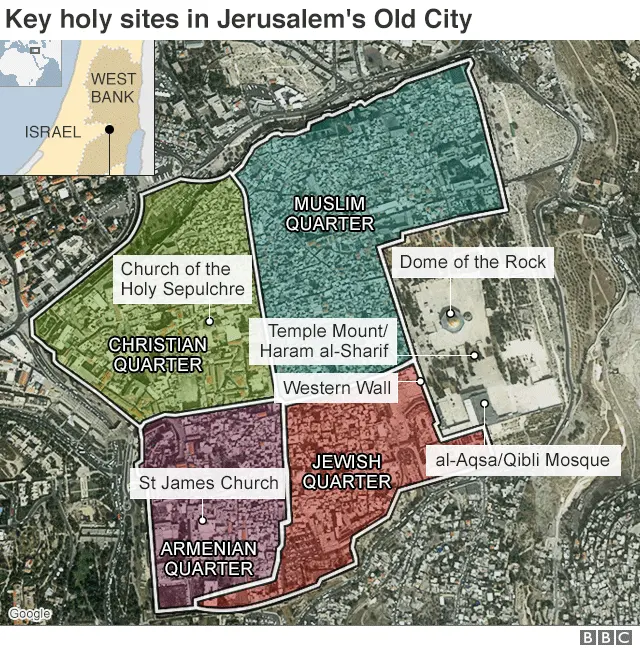Jerusalem: Guatemala follows US in planning Israel embassy move
Guatemala is to move its embassy in Israel to Jerusalem, becoming the first country after the US to vow to do so.
It was one of only nine to vote against a UN resolution which in effect repudiated the US' recognition of Jerusalem as Israel's capital.
Israel's PM thanked Guatemala's president, but Palestinians branded the decision "shameful and illegal".
Donald Trump's controversial declaration on Jerusalem has been widely spurned around the world.
The status of the city is one of the most sensitive issues in the Israeli-Arab conflict.
Israel considers the whole of Jerusalem as its capital, while the Palestinians seek East Jerusalem as the capital of a hoped-for Palestinian state.
Why is Guatemala doing this?
President Jimmy Morales made the announcement on Facebook, noting the "excellent relations" between Guatemala and Israel.
He did not say when the move would happen.
 EPA
EPAGuatemala, along with 12 other countries, had their embassies in Jerusalem until 1980, when they moved them to Tel Aviv after Israel annexed East Jerusalem, in a move not recognised internationally. All other countries still have their embassies in Tel Aviv.
Guatemala and Israel have a long history of political, economic and military ties. The Central American country is also a major recipient of US aid - something which Donald Trump threatened to cut to states that voted in favour of the UN resolution.
Israeli Prime Minister Benjamin Netanyahu thanked President Morales, saying more countries would follow suit.
"It is only the beginning and it is important," he wrote on Facebook.
On Twitter, the US embassy in Guatemala said (in Spanish) it "applauded the historic decision" by Mr Morales.
However, the Palestinian foreign ministry said the decision was "a shameful and illegal act" that violated the UN resolution.
Where does the rest of the world stand?
Last week, UN members decisively backed a resolution that said any decisions regarding the status of the Jerusalem were "null and void" and must be cancelled.
The non-binding vote was approved by 128 states, with 35 abstaining. Another 21 countries did not turn up for the vote.
Aside from the US and Israel, Guatemala was joined by Honduras, the Marshall Islands, Micronesia, Nauru, Palau and Togo in voting against the resolution.
Why does it matter?
The status of Jerusalem goes to the heart of the Israeli-Palestinian conflict.
Israel regards Jerusalem as its "eternal and undivided" capital, while the Palestinians claim East Jerusalem - occupied by Israel in the 1967 Middle East war - as the capital of a future state.
Israeli sovereignty over Jerusalem has never been recognised internationally, and according to the 1993 Israel-Palestinian peace accords, the final status of Jerusalem is meant to be discussed in the latter stages of peace talks.
Since 1967, Israel has built a dozen settlements, home to about 200,000 Jews, in East Jerusalem. These are considered illegal under international law, though Israel disputes this.
Jerusalem is also home to key religious sites sacred to Judaism, Islam and Christianity, especially in East Jerusalem.

